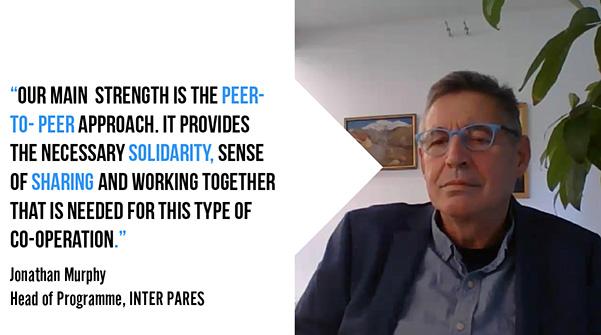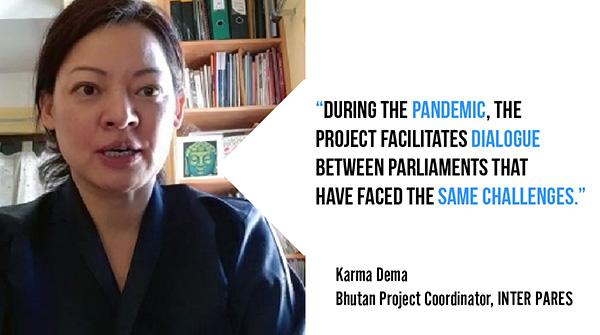Parliaments worldwide have had to adapt to the challenges created by the COVID-19 crisis. Digital responses have been proposed to keep democratic processes and political debates alive. INTER PARES, the EU´s first global parliamentary strengthening project, is collecting and sharing best practices on how to reinforce parliamentary democracy.
INTER PARES | Parliaments in Partnership operates through peer-to-peer exchanges, facilitating the sharing of experiences between EU Member State Parliaments and those of partner countries around the world.
Building partnerships

The peer-to-peer partnerships approach proved to be the best practice for this project. “INTER PARES aims to engage with the whole ´community of practice´ around parliamentary strengthening”, said Gonzalo Jorro Martinez, the project´s programme manager at the European Commission´s DG DEVCO. “Beyond the EU Member State Parliaments and other EU institutions - notably the European Parliament, where the project was launched in 2019 - and the European External Action Service (EEAS), we also involve and collaborate with other relevant organisations like the United Nations and the Inter-Parliamentary Union (IPU), or specialised foundations and NGOs. We have also reached out to academia and have set up a working group with the main scholars of parliaments in Europe. Our aim is to reinforce the link between academia and the practice of parliamentary development.”
COVID-19
In the context of the COVID-19 pandemic, INTER PARES documented parliamentary responses to the health crisis. The project published a primer on “Parliaments and Crisis: Challenges and Innovations” in early May 2020. On the International Day of Parliamentarism, which takes place every 30 June, it released a data-tracking map showing parliament responses in 166 countries.
Partner parliaments: the case of Bhutan

Having started a democratic transition in 2008, the Kingdom of Bhutan was one of INTER PARES´ first partners. After numerous consultations with the European Union and the team of INTER PARES at International IDEA, country-specific priority areas and objectives were identified. Following approval by the Parliament of Bhutan, these objectives were shared with all EU Member State Parliaments, calling them to partner with their peers in Bhutan on one or more priorities.
This partnership focuses on challenges faced by the country's parliament in carrying out its legislative, oversight and representative functions effectively. It aims in particular at (i) enhancing the legislative and oversight capacities, (ii) strengthening the professional capacity of the secretariat and (iii) enhancing parliament communication and dialogue capacities. The EU Member State Parliaments involved in this partnership are the Danish Parliament, the Hellenic Parliament (Greece) and the Hungarian National Assembly.
A virtual legislative drafting dialogue
One of Bhutan´s main priorities is to strengthen the analytical capacity of Members of Parliament and staff to draft legislation and amendments in line with international standards(1).
In August 2020, a one-week hybrid online dialogue was organised on legislative drafting. Participants including both MPs and staff sat in the Institute for Management Studies in Thimpu, Bhutan, maintaining the necessary distance, while academic professors and peers joined them from Europe virtually.
“The training was an unmitigated success with almost 90% attendance of those registered throughout”, said Karma Dema, Bhutan Programme Coordinator for INTER PARES. The project invited one of the world´s most recognised scholars in the field, Professor Dr Helen Xanthaki, to lead the theoretical sessions. These were complemented with practical sessions that included legislative drafting experts from the Council of the European Union and EU Member State Parliaments(2).
The strong interest from both MPs and secretariat staff, the high level of expertise of the trainers and peers, and the innovative and effective delivery methods of this course contributed to its positive outcome.
INTER PARES main takeaways from Bhutan:
Karma Dema, Bhutan Programme Coordinator for INTER PARES, shared the key lessons learnt from her perspective:
- Trust. A favourable working environment based on trust is essential; both with the members of the parliament and the staff, together and separately.
- Common ground. Engaging in dialogue with parliaments that have faced the same challenges they are facing is highly valuable.
- Demand-driven. The project responds to the needs of the parliament itself and to its key mandate and priorities.
- Local coordination. The presence of a local-based coordinator in Bhutan allows a deeper understanding of the local reality and facilitates a regular flow of communication.
- Flexibility and adaptation. Being able to innovate and support parliaments at short notice is key. This is particularly crucial during the COVID-19 pandemic.
Next steps
The project will continue to carry out activities using innovative approaches - making use of digital technologies as appropriate - in the hope that the “traditional” way of conducting activities will soon be possible again.
The following video sheds light on the work of Parliaments in times of COVID-19 and on INTER PARES cooperation in Bhutan.
|
ABOUT INTER PARES “INTER PARES | Parliaments in Partnership” is the EU´s Global Project to Strengthen the Capacity of Parliaments. It is funded by the European Instrument for Democracy and Human Rights (EIDHR) and implemented by the International Institute for Democracy and Electoral Assistance (International IDEA). This three-year project (2019-2021) aims to promote representative democracy by strengthening parliaments´ core functions of representation, legislation, oversight and budget, as well as their effective functioning as a public administration. INTER PARES was conceived as a ‘pilot’ project, the first of its kind for two main reasons. It has a global geographical scope and, as explained, a special implementation style: the peer-to-peer approach. Hence its name, INTER PARES, which is Latin for among peers. Beyond the peer-to-peer exchanges Beyond the peer-to-peer exchanges, which are the core of the project, INTER PARES has two further components. Its second stream of work is promoting sustainable inter-parliamentary cooperation and parliamentary support approaches. In this respect, the project participates in a group led by the IPU to develop indicators for democratic parliaments. It also organises conferences to discuss specific issues, such as parliaments’ engagement with civil society. The project´s third component is the promotion of research, knowledge and innovation on parliamentary matters. Here, INTER PARES supports the revitalisation of the AGORA portal, an online knowledge-sharing platform for parliaments, scholars and practitioners. It also supports the IPU´s recently established Centre for Innovation in Parliament (CIP) as well as the iKnowpolitics portal that promotes women´s empowerment and participation in political life. On top of that, it produces so-called “primers” (briefings or reports) on specific parliament-related issues. During the first months of the COVID-19 crisis, it published the first one on “Parliaments and Crisis: Challenges and Innovations”. Thematic priorities While the project´s main objective remains strengthening parliaments’ core functions, there is a particular emphasis on six thematic priorities: Gender Equality and Women’s Empowerment, Human Rights, Environmental Protection and Climate Change, Youth, Digital Technology for Development, and Citizens’ Engagement and Civil Society. This means that it prioritises, for instance, supporting a Committee on Gender Equality or Women Caucus in the peer-to-peer exchanges, or that it will develop, for example, an e-learning course on “Parliaments and Climate Change”. Partner parliaments In the spring of 2019, during the project’s inception phase, over 40 EU Delegations expressed interest for their host-country parliaments to become partners. Given the project´s limited resources, a selection had to be made based on established criteria. In the three years of implementation, the aim is to facilitate at least 15 country-specific partnerships. Five partnerships were kick-started in 2019: Bhutan, The Gambia, Malaysia, Panama and the Maldives. A further round of partnerships was starting to be rolled out in early 2020 when the pandemic hit, including Trinidad & Tobago, Malawi and Mauritania. Online event On 17 September 2020, as part of Democracy Week 2020, INTER PARES organised a webinar called “Parliaments’ responses to the pandemic: are virtual parliaments here to stay?” The video recording is available on the EP’s website. Reference document “Engaging and Supporting Parliaments Worldwide: Strategies and methodologies for EC action in support to parliaments” is a Reference Document part of the Tools & Methods series. It is a practical tool for use in planning European Commission parliamentary strengthening programmes and to a lesser extent in engaging with parliaments in development cooperation in partner countries. More More information about INTER PARES is available on the project´s website, by subscribing to the project´s newsletter or by following INTER PARES on Facebook, Twitter, Instagram and YouTube.
|
1. Read more about the work of INTER PARES in Bhutan, click here.
2. Such as the Irish Parliament, the Polish Parliament, the National Council of Slovakia, the Parliament of the Czech Republic and the Hellenic Parliament.
Credit: Videos © Capacity4dev | Photo © Joakim Honkasalo on Unsplash





Log in with your EU Login account to post or comment on the platform.